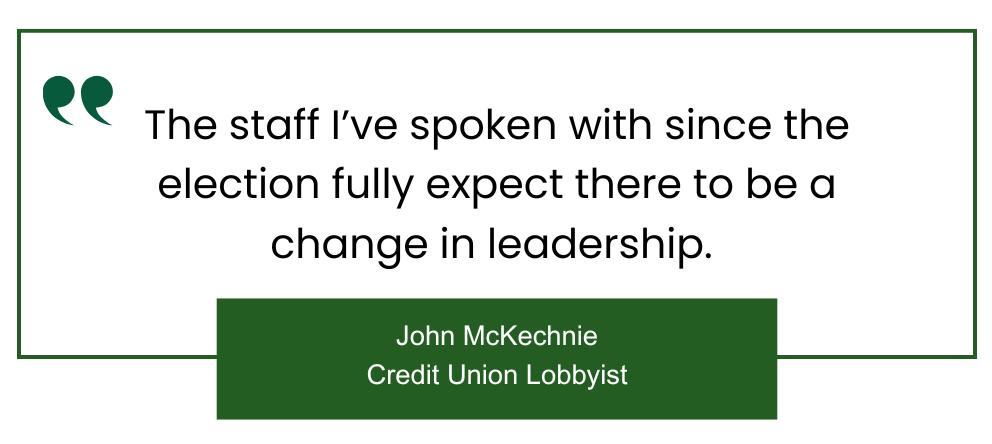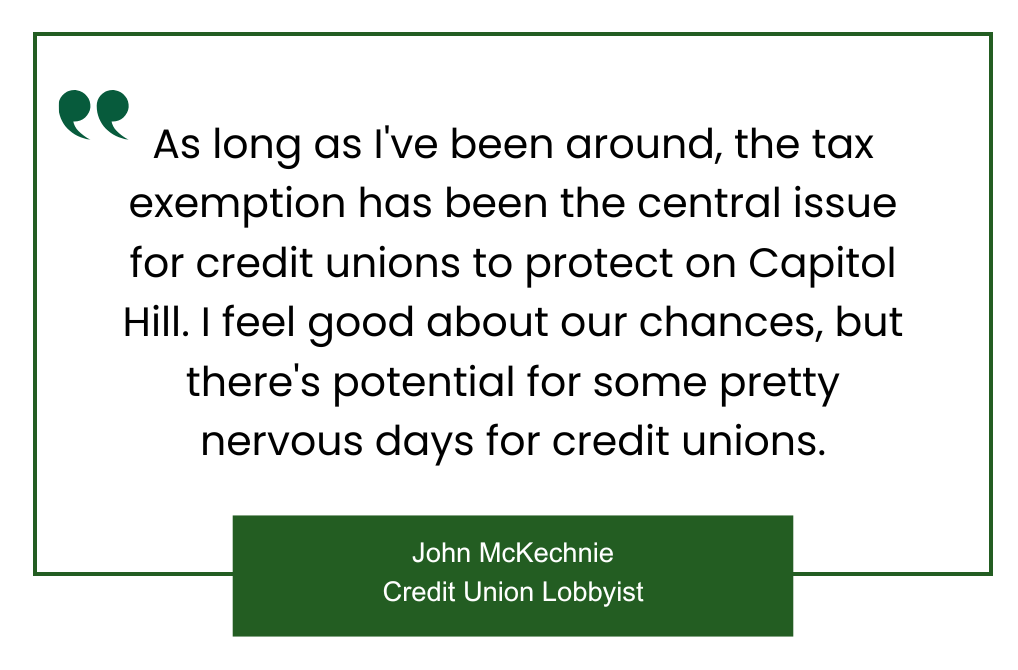December 2, 2024

With the New Year beckoning a new political administration, LendKey spoke with John McKechnie—a nearly 40-year veteran of Capitol Hill, the credit union system, and a seasoned lobbyist—about what credit unions can expect in 2025. Here are his top three takeaways.
Changes at the Top
It’s par for the course that an incoming Republican president cites tackling swollen government and overreaching regulators as a priority, but few do so with the verve and volume of President-elect Trump. Certainly towards the top of his to-do list will be the Consumer Financial Protection Bureau’s (CFPB) Director Rohit Chopra.
As a Biden-appointee, Director Chopra’s tenure under Trump was always going to be tenuous, but a flurry of rulemaking in the lame-duck period is likely to expedite an exit.
“I think you’re going to see a new Republican director at CFPB with a different philosophy than Mr. Chopra’s,” says McKechnie, whose extensive resume includes senior positions at both the NCUA and CUNA (now America’s Credit Unions). “The staff I’ve spoken with since the election fully expect there to be a change in leadership.
“Once that happens, the Republicans in Congress have two pieces of legislation [to pass]. One would create a five-member commission instead of having a single director; the other would give Congress effective control of the purse strings.”
This would be a major shift for an institution (if indeed it survives at all) that currently receives money from the Fed with no congressional input, and could radically reduce and/or remove certain lending regulations, even the recent final Rule 1033. But what of the NCUA?
“The president can change the NCUA chairman with the stroke of a pen,” confirms McKechnie. “Chairman Harper could be replaced with Kyle Hauptman, the single Republican on the board. Then you may see a reevaluation of how consumer regulations are put forth. Chairman Harper placed a strong emphasis on fair lending oversight and on things like overdraft products offered by credit unions that a Chairman Hauptmann may want a lighter touch on.”
Chairman Harper did recently confirm that, if replaced as Chair, he would continue on the board through the remainder of his term, but a Hauptman term could certainly shift lending policy.

Liquidity Constraints Remain Challenging
Despite two successive Federal rate cuts at the tail-end of Biden’s term, liquidity remains elusive for many credit unions heading into the Trump era.
During a November session, NCUA Chairman Harper acknowledged an eight percent increase in the Central Liquidity Fund’s (CLF) coffers; a figure that, on the face of it, bodes well for credit unions, but according to Harper is demonstrative of a system blowing hot and cold. “We continue to see signs of financial strain on credit union balance sheets,” Chairman Harper said.
In fact, during testimony in front of Congressional committees earlier this year, Harper articulated a strong need for updating the CLF’s ability to distribute liquidity, including enhancing the role of corporate credit unions as agents for getting liquidity out the door in the event of an unforeseen crisis … McKechnie agrees.
“Shortly after the pandemic, there was some real concern about liquidity,” says McKechnie. “This has lessened, and credit unions continue to do a great job of managing liquidity, but they could also use more sources.”
One such source could be that very same CLF. “NCUA’s central liquidity facility is an important backstop and I’d like to see that get modernized on Capitol Hill,” explains McKechnie, adding, “I suspect that the Fed may try to pare back some of the Basel III required capital requirements too.”
In that scenario, liquidity constraints could certainly be eased by allowing credit unions to reallocate capital, but too much, too quickly, could also destabilize a system that has seen a concerning increase in the number of institutions scoring CAMELS codes 4 and 5.

Tax Reform on the Horizon
Lastly, if regulatory uncertainties and liquidity challenges didn’t sound familiar enough, McKechnie posits a renewed, full-front assault on credit union tax exemptions.
“In the early half of 2025, Congress seems to be anxious to move on tax reform,” explains McKechnie. “There are a lot of expiring tax provisions from the 2017 law that they want to tackle. That’s going to be a big issue for credit unions.”
McKechnie cites the need for revenue on Capitol Hill to be a key driver in any renewed effort, and that elected credit union advocates are already enthusing credit unions to “polish up your arguments.”
“As long as I’ve been around, the tax exemption has been the central issue for credit unions to protect on Capitol Hill. I feel good about our chances, I like our team, but there’s potential for some pretty nervous days for credit unions.”
Ultimately, the implications of an incoming presidential administration are rarely clear—the disparities between campaign promises and political realities are simply too disparate—but LendKey is here regardless, with the insights, expertise, and assets to keep your credit union lending through 2025 and beyond.
